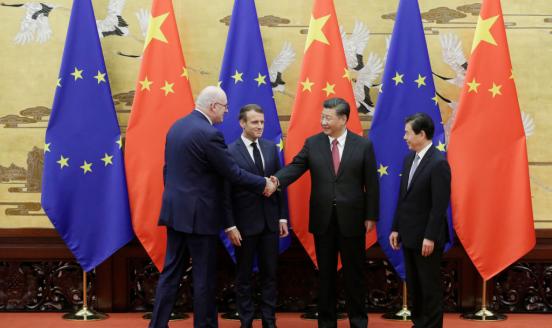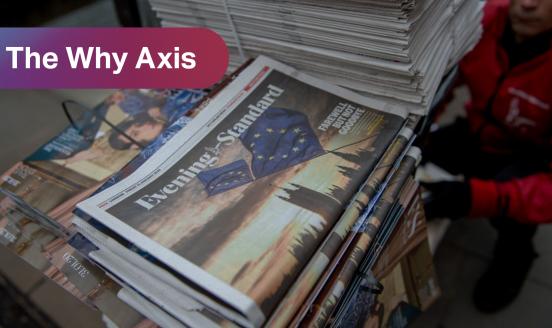12 Charts for 21
A selection of charts from Bruegel’s weekly newsletter, analysis of the year and what it meant for the economy in Europe and the world.

Year end is always the time for lists. There were hopes 2021 would be a year of recovery and emergence from the pandemic, but unfortunately this does not seem to be the case just yet. This year has also been marked by many other developments including rising geopolitical rivalry between the United States and China, new work practices becoming more entrenched, energy price hikes and inflation, and efforts at COP26 to overcome barriers to tackling the climate emergency.
Bruegel has observed and analysed these trends. We’ve selected one chart for each month of 2021 from the ‘chart of the week’ series in The Why Axis, Bruegel’s weekly newsletter. These tell some of the economic stories Bruegel scholars have researched and written about this year: snapshots of how the year evolved, and indications of what might come in 2022.
1. Vaccinations campaigns get underway
From: The Why Axis, Thursday 7 January
The first approvals of COVID-19 vaccinations at the end of 2020 marked the start of ‘the global race to vaccinate’. In comparison with Israel, the United Kingdom and the United States, vaccination in the EU got off to a slow start. The European Commission, responsible for vaccine procurement, was criticised for being slow to sign contracts and ensure enough manufacturing capacity and doses. Niclas Poitiers provided regular updates and analysis of the state of vaccination in the EU. Ultimately, the EU campaign met its targets and western EU countries are now among the most vaccinated in the world. The debate has since moved on to COVID-19 passports, uptake issues, booster jabs and worldwide vaccine inequity, creating the conditions for new variants of the virus.
Read, Listen, Watch
- Marcus, J.S. (2021) ‘Has the European Union squandered its coronavirus vaccination opportunity?’ Bruegel Blog, 6 January.
- Dadush, U. (2021) ‘A matter of life and death: governments must speed up vaccination’, Bruegel Blog, 13 January.
- Jeanrenaud, L., M. Mariniello and G. Wolff (2021) ‘What do vaccination passports mean for Europe?’ Bruegel Blog, 20 January.
- Guetta-Jeanrenaud, L. and M. Mariniello (2021) ‘Fair vaccine access is a goal Europe cannot afford to miss’, Bruegel Blog, 4 March.
- Marcus, J. Scott and N. Poitiers (2021) ‘An update: Vaccination in the EU’, Bruegel Blog, 17 March.
- Where did the vaccine strategy go wrong? The Sound of Economics, 20 January.
- Leigh, M. (2021) ‘Vaccine diplomacy: soft power lessons from China and Russia?’ Bruegel Blog, 27 April.
- Pandemonium, The Sound of Economics, 17 November.
2. Business support measures
From: The Why Axis, Thursday 25 February
EU governments sought to offset the economic impact of COVID-19 lockdowns through a host of initiatives, including bank loan guarantees, particularly for smaller companies (SMEs). In February, Julia Anderson, Francesco Papadia and Nicolas Véron looked in detail at national credit-support programmes implemented in the context of fiscal policy, in France, Germany, Italy, Spain and the United Kingdom.
By the end of the year, the effectiveness of support given to firms could be evaluated. Carlo Altomonte, Maria Demertzis, Lionel Fontagné and Stefen Mueller gathered evidence showing that government support during the COVID-19 crisis protected employment. However, the evidence is varied on how efficiently this was done in terms of helping viable firms, rather than those that could have been expected to fold anyway. As the pandemic continues, uncertainty remains about the scarring effects of the crisis; the long-term implications of support measures are only partially understood.
Read, Listen, Watch
- So long, credit support? The Sound of Economics, 17 February.
- Anderson, J., F. Papadia and N. Véron (2021) ‘COVID-19 credit-support programmes in Europe’s five largest economies, Working Paper 03/2021, Bruegel
- The impact of COVID-19 on productivity: preliminary firm evidence, Bruegel Event, 18 March.
- Restarting the economy? The Sound of Economics, 30 June.
- Loan guarantees and other national credit-support programmes in the wake of COVID-19”, Bruegel Dataset, last update 23 September 2021.
- Altomonte, C., M. Demertzis, L. Fontagné and S. Mueller (2021) ‘COVID-19 financial aid and productivity: has support been well spent?’ Policy Contribution 21/2021, Bruegel.
- Phasing out COVID-19 emergency support programmes: effects on productivity and financial stability, Bruegel Event, 9 November.
- The fiscal response to the economic fallout from the coronavirus, Bruegel Dataset, last update 24 November 2021.
3. Watching inflation
From: Updated chart from The Why Axis, Thursday 25 March - HICP has been extended to November 2021.
Rising prices and the threat this poses to the recovery have divided policymakers. Maria Demertzis highlighted the importance of tackling and preparing for uncertainties in the face of inflation and variants of COVID-19. As early as March 2021, Grégory Claeys and Lionel Guetta-Jeanrenaud highlighted how the pandemic complicates inflation measurement. Zsolt Darvas and Catarina Martins explained why owner-occupied housing services should be included in the inflation indicator, to accurately reflect rising costs faced by homeowners.
As inflation rises across Europe, Guntram Wolff, Maria Demertzis, Francesco Papadia, Monika Grzegorczyk and Pauline Weil assessed future prospects in a context of continued fiscal support and recovering economies. Marek Dabrowski also assessed the need to scale back monetary easing and support in the exit from the pandemic.
Read, Listen, Watch
- Demertzis, M. (2021) ‘Continuing fiscal support and the risk of inflation’, Bruegel Blog, 17 February
- Claeys, G. and L. Guetta-Jeanrenaud (2021) ‘How has COVID-19 affected inflation measurement in the euro area?’ Bruegel Blog, 24 March.
- An alpine divide? Comparing economic cultures in Germany and Italy, Bruegel Event, 13 April.
- Wolff, G. (2021) ‘Inflation!? Germany, the euro area and the European Central Bank’, Bruegel Blog, 9 June.
- Claeys, G. and L. Guetta-Jeanrenaud (2021) ‘How have the European Central Bank’s negative rates been passed on?’ Bruegel Blog, 7 July.
- Grzegorczyk, M., F. Papadia, and P. Weil (2021) ‘Is the risk of stagflation real?’, Bruegel Blog, 2 November.
- Darvas, Z. and C. Martins (2021) ‘Including home-ownership costs in the inflation indicator is not just a technical issue’, Bruegel Blog, 18 November.
- Dabrowski, M. (2021) ‘Monetary arithmetic and inflation risk’, Bruegel Blog, 27 September.
- Dabrowski, M. (2021) ‘Fiscal arithmetic and risk of sovereign insolvency’, Bruegel Blog, 18 November.
4. Mapping Europe’s recovery plans
From: The Why Axis, Thursday 29 April
The Next Generation EU programme has changed the way the EU finances itself, interacts with financial markets and supports national recoveries. In late April, countries began submitting their recovery and resilience plans. An initial analysis by Zsolt Darvas and Simone Tagliapietra showed that the plans of the four largest EU countries, France, Germany, Italy and Spain, reflect rather different priorities, even if all met the EU recovery fund’s minimum expenditure benchmarks for climate and digitalisation. Bruegel scholars monitored the national plans as they were submitted, providing a comprehensive dataset and further analysis throughout the year. Below is the most up to date assessment of the plans, based on submissions by EU countries.
From: Bruegel Dataset (2021), European Union countries’ recovery and resilience plans, last update 1 December 2021
In November, Rebecca Christie, Gregory Claeys and Pauline Weil assessed the market impact of EU borrowing and decisions taken in terms of European Commission market operations. They also outlined the risks and opportunities linked to this upgrading of EU borrowing. The implementation of recovery plans and their coordination at EU level will continue to be a focus of Bruegel analysis in 2022.
Read, Listen, Watch
- Darvas Z. and G. Wolff (2021), ‘The EU’s fiscal stance, its recovery fund, and how they relate to the fiscal rules’, Bruegel Blog, 4 March.
- Darvas, Z. (2021) ‘The nonsense of Next Generation EU net balance calculations’, Policy Contribution 03/2021, Bruegel.
- Darvas, Z. and S. Tagliapietra (2021) ‘Setting Europe’s economic recovery in motion: a first look at national plans’, Bruegel Blog, 29 April.
- Darvas, Z., J. Scott and A. Tzaras (2021) ‘Will European Union recovery spending be enough to fill digital investment gaps?’ Bruegel Blog, 20 July.
- The EU recovery fund – state of play and outlook, The Sound of Economics, 1 September.
- Rethinking fiscal policy, The Sound of Economics, 20 October.
- Christie, R., G. Claeys and P. Weil (2021) ‘Next Generation EU borrowing: a first assessment’ Policy Contribution 22/2021, Bruegel
- European Union countries’ recovery and resilience plans, Bruegel Dataset, last update 1 December.
5. Banking and finance
From: The Why Axis, Thursday 24 June
In early 2021, Maria Demertzis, Marta Domínguez-Jiménez and Lionel Guetta-Jeanrenaud highlighted the importance of the completion of the EU’s capital markets union for financial stability and for financing high-tech sectors. In September, Dirk Schoenmaker laid out why companies and businesses should start to make investment decisions based on integrated-value assessment, weighing up the environmental and social impacts alongside the financial returns. Alexander Lehmann outlined better sustainability data needed by investors for investment decisions. Rebecca Christie showed how special purpose acquisition vehicles might fill a gap in European equity markets.
Read, Listen, Watch
- Lehmann, A. (2021) ‘New EU insolvency rules could underpin business rescue in the COVID-19 aftermath’, Bruegel Blog, 24 March
- Anderson, J., D. Bholat, M. Gharbawi and O. Thew (2021) ‘The impact of COVID-19 on artificial intelligence in banking’, Bruegel Blog, 15 April
- Lehmann, A. (2021) ‘Confronting the risks: corporate debt in the wake of the pandemic’, Bruegel Blog, 28 April
- Lehmann, A. (2021) ‘Banks in a net-zero Europe’, Bruegel Blog, 1 June
- Demertzis, M., M. Domínguez-Jiménez and L. Guetta-Jeanrenaud (2021) ‘Europe should not neglect its Capital Markets Union’, Policy Contribution 13/2021, Bruegel
- Lehmann, A. (2021) ‘Banks post-Brexit: regulatory divergence or parallel tracks?’ Bruegel Blog, 6 July
6. Teleworking here to stay
From: The Why Axis, Thursday 10 June
COVID-19 has accelerated the transformation of work models. In 2020, teleworking in EU countries has surged, and many workers have proved that they can remote work efficiently. Monika Grzegorczyk, Mario Mariniello, Laura Nurski and Tom Schraepen proposed that the EU should develop a framework to facilitate hybrid work. However, the pandemic has also deepened inequalities in the workforce. Maria Demertzis and Mia Hoffmann found that COVID-19 has disproportionately affected women both professionally and at home; Georgios Petropoulos and Tom Schraepen discovered that remote working could exacerbate wage inequality. In the gig economy, platform workers and the self-employed could also be harmed, Mario Mariniello thus called for the European Union to boost gig workers’ rights.
Bruegel’s Future of work and inclusive growth project is a three-year research project to analyse the impact of technology on the nature, quantity and quality of work, welfare systems and inclusive growth at large. In the pandemic context, the project explores how technology is changing the nature of employment with new forms of work organisation, and how to balance power and reduce discrimination in the labour market.
Read, Listen, Watch
- ‘Protecting workers in the platform economy’, Bruegel event, 24 February.
- Nikolova, M. (2021) ‘Self-employment, COVID-19, and the future of work for knowledge workers’ Bruegel Blog, 4 March.
- ‘The Future of Work – a conversation with Commissioner Schmit’, Bruegel event, 25 May
- Grzegorczyk, M., M. Mariniello, L. Nurski and T. Schraepen (2021) ‘Blending the physical and virtual: a hybrid model for the future of work’, Policy Contribution 14/2021, Bruegel.
- Nurski, L. (2021) ‘Designing a hybrid work organisation’, Bruegel Blog, 5 July.
- ‘Blending physical and virtual: shaping the new workplace’, Bruegel event, 2 September
- Petropoulos, G. and T.Schraepen (2021) ‘Remote work, EU labour markets and wage inequality’, Bruegel Blog, 14 September.
- Mariniello, M. (2021) ‘For remote work to work, new ground rules are needed’, Opinion, 23 September.
- Petropoulos, G. (2021) ‘Making antitrust work for, not against, gig workers and the self-employed’, Bruegel Blog, 11 October.
- ‘A hybrid future of work’, Bruegel event, 19 October.
- Demertzis, M. and M. Hoffmann (2021) ‘The socioeconomic effects of COVID-19 on women’, Bruegel Blog, 3 November.
- Mariniello, M. (2021) ‘An inclusive European Union must boost gig workers’ rights’, Opinion, 7 December.
- ‘Future of work and inclusive growth: Digital dialogues’, Bruegel event, 7 December.
7. Climate emergency
From: The Why Axis, Thursday 15 July
In July 2021, the European Union proposed a plan to turn its climate pledges into reality. The package is intended to ensure the EU reduces its greenhouse gas emissions by 55% by 2030 compared to 1990, and reaches net-zero by 2050. Simone Tagliapietra analysed the package, which came ahead of COP26 negotiations in Glasgow in November. Some of the most ambitious measures, including a carbon border adjustment mechanism and an expansion of the EU’s emissions trading scheme, will be felt both inside and outside the bloc. Simone Tagliapietra, Jean-Pisani Ferry and Guntram Wolff highlighted the potential geopolitical consequences of the European Green Deal. Ben McWilliams and Georg Zachmann put forward proposals to support green fuel switching by households.
Read, Listen, Watch
- Green transformation: a Polish perspective, The Sound of Economics, 13 January
- The geopolitics of the Green Deal, Bruegel Event, 3 February
- The geopolitical repercussions of the European Green Deal, The Sound of Economics, 3 February
- McWilliams, B. and S. Tagliapietra (2021) ‘Carbon border adjustment in the United States: not easy, but not impossible either’, Bruegel Blog, 11 February
- Prospects for the US climate policy under the Biden Administration, Bruegel Event, 17 February
- Leonard, M., J.Pisani-Ferry, J. Shapiro, S. Tagliapietra and G. Wolff (2021) ‘The geopolitics of the European Green Deal’, Policy Contribution 04/2021, Bruegel
- Demertzis M. and S. Tagliapietra, (2021) ‘Carbon price floors: an addition to the European Green Deal arsenal’ Bruegel Blog, 4 March
- Edenhofer, O., M.Kosch, M. Pahle and G. Zachmann (2021) ‘A whole-economy carbon price for Europe and how to get there’, Policy Contribution 06/2021, Bruegel
- McWilliams, B. and G. Zachmann (2021) ‘Navigating through hydrogen’, Policy Contribution 08/2021, Bruegel
- Tagliapietra, S. (2021) ‘Fit for 55 marks Europe’s climate moment of truth’, Bruegel Blog, 14 July
- A fitting plan for the European Green Deal?, The Sound of Economics, 15 July
- Sapir, A. (2021)’The European Union’s carbon border mechanism and the WTO, Bruegel Blog, 19 July
- García Herrero, A., S. Tagliapietra and V. Vorsatz (2021) ‘Hydrogen development strategies: a global perspective’, Bruegel Blog, 30 August
- A Late Bloomer: where is China’s climate plan?, The Sound of Economics, 8 September
- The role of the state in providing infrastructure for decarbonisation, Bruegel Event, 2 September
- Lenaerts, K. and S. Tagliapietra (2021) ‘Goodbye Glasgow: what’s next for global climate action?’, Bruegel Blog, 18 November
- Can COP26 save the planet?, The Sound of Economics Live, 28 October
- COP26: global stocktake and what’s next, The Sound of Economics Live, 25 November
- European Green Deal beyond the Brussels climate bubble, Bruegel Event, 2 December
8. China as seen from Europe
From: ZhōngHuá Mundus, Will the private sector save China’s growth model? June 2021
ZhōngHuá Mundus is Bruegel’s monthly newsletter exploring China's global role and its impact on Europe.
China’s economic success cannot be understood without understanding the dynamism of its private sector. The share of assets held by privately-owned enterprises in China has ballooned in recent years, although state-owned enterprises are still in the dominant position. Alicia García-Herrero and Giuseppe Porcaro discussed whether the private sector could save China’s growth model at a time when the country’s growth rate is waning. They also discussed how the ‘common prosperity’ drive, an antitrust push and regulatory measures in the tech industry, and the decarbonisation process will affect the private sector. Bruegel’s Nicolas Véron is working on a study of ownership structures of China’s largest companies, evaluating whether the government’s policies in favour of state-owned enterprises have hindered the advancement of the private sector.
Bruegel scholars will continue in 2022 to monitor China’s economic affairs. ZhongHua Mondus in December discussed what to expect from the Chinese economy in 2022.
Read, Listen, Watch
- ‘Will China fall into the middle/high income trap?’, The Sound of Economics,3 March
- García-Herrero, A. and G. Ng (2021) ‘China’s state-owned enterprises and competitive neutrality'’, Policy Contribution 05/2021, Bruegel
- ‘A digital yuan?’, The Sound of Economics, 14 April
- ‘China and the WTO: (How) can they live together?’, Bruegel event, 28 April
- García Herrero, A. and J. Xu (2021) ‘China’s M&A activity rebounds with a clear focus on Europe’, Bruegel Blog, 04 May
- ‘New kid in the playground: China’s antitrust push’, The Sound of Economics, 12 May
- Dadush, U. and P. Weil (2021) ‘How difficult is China’s business environment for European and American companies? ‘, Policy Contribution 12/2021, Bruegel
- ‘Challenges and growth of China’s private sector’, The Sound of Economics, 9 June
- ‘CCP’s 100th Anniversary: Reflecting and looking forward’, The Sound of Economics, 7 July
- ‘Academic lecture: International technology competition’, Bruegel event, 3 September
- ‘A Late Bloomer: where is China’s climate plan?’, The Sound of Economics, 8 September
- ‘Will ‘common prosperity’ address China’s inequality?’, The Sound of Economics, 13 October
- ‘Why is China cracking down on big tech?’, The Sound of Economics, 10 November
- ‘China’s medium term outlook: Will innovation save China from becoming old before it becomes rich?’, Bruegel event, 1 December
- ‘What to watch in 2022: China’s economic outlook’, The Sound of Economics, 8 December
9. Energy prices surge
From: The Why Axis, Thursday 23 September
Natural gas prices have soared in Europe, sparking concerns about households’ monthly bills and the potential macroeconomic implications. This chart published in September showed that prices started to spike at the beginning of 2021. While trying to answer whether Europe’s gas and electricity price surge would be a one-off, Simone Tagliapietra and Georg Zachmann proposed support measures European governments should offer; later in the year with the arrival of the winter, rising energy prices became even more concerning. Ben McWilliams and Georg Zachmann put forward proposals to support green fuel switching by households. A Bruegel dataset tracks and gives an overview of the different policies implemented by EU countries at national level to mitigate for consumers the effects of higher energy prices.
Read, Listen, Watch
- Leonard, M., J.Pisani-Ferry, J. Shapiro, S. Tagliapietra and G. Wolff (2021) ‘The geopolitics of the European Green Deal’, Policy Contribution 04/2021, Bruegel
- ‘The geopolitical repercussions of the European Green Deal’, The Sound of Economics, 3 February
- McWilliams, B. and G. Zachmann (2021) ‘Making sure green household investment pays off’, Bruegel Blog, 19 July
- Tagliapietra, S. and G. Zachmann (2021) ‘Is Europe’s gas and electricity price surge a one-off?’, Bruegel Blog, 13 September
- ‘Exploding energy prices’, The Sound of Economics, 23 September
- Sgaravatti, G., S. Tagliapietra and G. Zachmann (2021) ‘Rising energy prices: European Union countries’ views on medium-term policies’, Bruegel Blog, 29 November
- ‘Bruegel electricity tracker of COVID-19 lockdown effects’, Bruegel dataset, Last update 29 November
- ‘European natural gas imports’, Bruegel dataset, Last update 2 December
- ‘National policies to shield consumers from rising energy prices’, Bruegel dataset, Last update 10 December
- McWilliams, B., G. Sgaravatti and G. Zachmann (2021) ‘How serious is Europe’s natural gas storage shortfall?’, Bruegel Blog, 21 December
10. Do we need to ditch growth?
From: The Why Axis, Thursday 7 October
We probably can’t have it all. The cost of reaching net zero isn’t known for sure but the cost of doing nothing will be higher. Amid the flurry of estimates published ahead of COP26, Klaas Lenaerts, Simone Tagliapietra and Guntram Wolff looked into both the cost of the transition and whether the current economic model should be ditched. Fossil fuels still account for around 80% of the global energy mix and economic growth so far has tended to go hand in hand with higher greenhouse gas emissions, leaving questions about the compatibility of growth and decarbonisation. Overall, the three authors highlighted that the cost of the transition will have significant macroeconomic implications and degrowth proposals are not viable, so the focus must be on decoupling economic growth and emissions.
Read, Listen, Watch
- The economics of biodiversity, Bruegel Event, 3 March
- Lenaerts, K., S. Tagliapietra and G.B. Wolff (2021) ‘How much investment do we need to reach net zero?’, Bruegel Blog, 25 August
- Darvas, Z. and G. Wolff (2021) ‘A green fiscal pact: climate investment in times of budget consolidation’, Policy Contribution 18/2021, Bruegel
- A green fiscal pact, The Sound of Economics, 29 September
- Lenaerts, K., S. Tagliapietra and G.B. Wolff (2021) ‘Can climate change be tackled without ditching economic growth?’, Working Paper 10/2021, Bruegel
- What is the link between biodiversity loss and financial instability?, Bruegel Event, 5 October
- Can climate change be tackled without ditching economic growth?, Bruegel Event, 28 October
11. New tech in the workplace
From: The Why Axis, Thursday 18 November
Artificial intelligence could unlock the next productivity boom. To realise these gains, AI technologies need to be adopted by companies and integrated into their operations. According to Eurostat, one in ten EU companies uses biometric authentication and verification in the workplace, with use rates ranging from as high as 24% in Malta to 4% in Slovenia and Bulgaria. While acknowledging the huge potential, it is necessary to evaluate the risks of putting AI in the workplace, including possible personal data abuse or potential psychological distress caused by permanent monitoring. As part of Bruegel’s Future of Work and Inclusive Growth project, Mario Mariniello and Mia Hoffmann proposed a taxonomy to underpin the use of AI-powered biometric technologies in the workplace. Meanwhile, Laura Nurski and Mia Hoffmann looked into why AI adoption in Europe is running behind other parts of the world, and Rebecca Christie discussed the idea of a ‘robot tax’ as a source of government revenue when automated systems replace human capital.
Read, Listen, Watch
- Nurski, L. (2021) ‘Algorithmic management is the past, not the future of work’, Bruegel Blog, 6 May
- ‘The work of the future: How are new jobs created and what are the implications for labour markets?’, Bruegel event, 25 May
- ‘The skills of the future’, The Sound of Economics, 23 June
- Hoffmann, M. and L. Nurski ‘Workers can unlock the artificial intelligence revolution’, Bruegel Blog, 30 June 2021
- ‘Are robots taking our jobs?’, The Sound of Economics, 20 July
- Christie, R. (2021) ‘Do robots dream of paying taxes?’, Policy Contribution 20/2021, Bruegel
- ‘Is tech redefining the workplace for women?’, The Sound of Economics, 6 October
- Wang, J., G. Petropoulos, and S. Steffen (2021) ‘Concentration of artificial intelligence and other frontier IT skills’, Bruegel Blog, 21 October
- Hoffmann, M. and M. Mariniello (2021) ‘Biometric technologies at work: a proposed use-based taxonomy’, Policy Contribution 23/2021, Bruegel
- ‘Technology: a product of unequal power?’, The Sound of Economics, 24 November
- Hoffmann, M. and L. Nurski (2021) ‘What is holding back artificial intelligence adoption in Europe?’ Policy Contribution 24/2021, Bruegel
- Hoffmann, M. and L. Nurski (2021) ‘The triple constraint on artificial-intelligence advancement in Europe’, Bruegel Blog, 6 December
- ‘ Future of work and inclusive growth: Digital dialogues’, Bruegel event, 7 December
12. The continuous rebranding of EU foreign policy instruments
From: The Why Axis, Thursday 9 December
The EU’s Global Gateway initiative will seek to mobilise €300 billion in infrastructure spending worldwide, as an implicit response to China’s Belt and Road Initiative. Simone Tagliapietra unpacked the plan which, despite lacking new cash and relying on crowding-in of private investment, uses funds strategically in specific ‘values based’ and ethical ways. Bruegel has covered the European Union’s increasing assertiveness towards neighbours over the past year, including the external repercussions of the Green Deal, managing a crisis at its borders, building a future relationship with a former member, strengthening the international role of the euro and tackling a resurgent China.
Read, Listen, Watch
- Sapir, A. (2021) The double irony of the new UK-EU trade relationship, Bruegel Blog, 12 January
- Leonard, M., J.Pisani-Ferry, J. Shapiro, S. Tagliapietra and G. Wolff (2021) ‘The geopolitics of the European Green Deal’, Policy Contribution 04/2021, Bruegel
- The geopolitics of the Green Deal, Bruegel Event, 3 February
- Carbon Border Adjustment Mechanism: Greening the EU trade?, Bruegel Event, 4 February
- A stronger euro comes with more responsibility The Sound of Economics, 19 May
- Belarus: a test for Europe’s foreign policy? The Sound of Economics, 1 June
- Sapir, A. (2021)’The European Union’s carbon border mechanism and the WTO, Bruegel Blog, 19 July
- The future of EU-Africa relations, Bruegel Event, 1 September
- Towards a new global trade regime: reform of the WTO, Bruegel Event, 2 September
- Demertzis, M. (2021) ‘The inconsistency in global strategic relations’ Bruegel, 13 October
- The state of trade: the EU's trade policy, The Sound of Economics, 3 November
- Tagliapietra, S. (2021) ‘The Global Gateway: a real step towards a stronger Europe in the world?’, Bruegel Blog, 7 December



